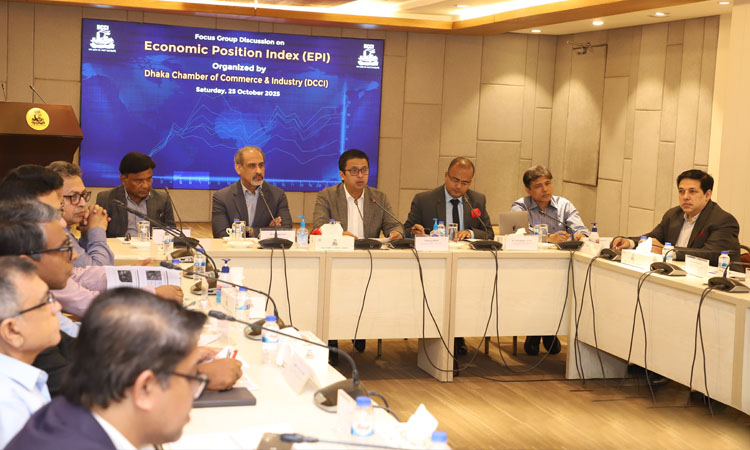News Flash
News Flash

DHAKA, Oct 25, 2025 (BSS) - The Dhaka Chamber of Commerce & Industry (DCCI) has taken an initiative to develop an “Economic Position Index (EPI)” with a view to formulating specific recommendations to improve the country’s overall economic condition through unveiling the real scenario of economic activities.
In order to get validation from relevant public and private sector stakeholders in this regard, the DCCI organized a Focus Group Discussion titled “Economic Position Index” today at its auditorium in the capital.
In his welcome speech, DCCI President Taskeen Ahmed, said that although there are several local and international indices measuring the business environment in the country, but these indices do not clearly reflect the real picture of how and why economic activities are changing.
Against this backdrop, he said the DCCI has taken this initiative to develop an ‘Economic Position Index (EPI)’ initially focusing on Dhaka city, with plans to gradually expand it nationwide. He noted that this quarterly index will provide clear insights, especially regarding production, sales, order flow, export trends, employment, business confidence, and investment tendencies in the industrial sector.
Taskeen also mentioned that the initial index includes data from ready-made garments, textiles, wholesale and retail trade, real estate, transportation and storage and banking sectors.
While presenting the keynote paper, Dr. A.K.M. Asaduzzaman Patwary, Acting Secretary General of DCCI, stated that the study was conducted during February–March 2025, involving interviews with a total of 654 respondents -- 365 from the manufacturing sector and 289 from the services sector.
He mentioned that the manufacturing sector sample covered eight industries including food products, textiles, ready-made garments, leather and leather goods, pharmaceuticals, medicinal chemicals and botanical products, rubber and plastic products, other non-metallic mineral products and basic metals.
Additionally, three service sectors -- wholesale and retail trade, land transport and real estate activities -- were included in the study. He mentioned that the study shows the manufacturing sector contributes 56 percent while the service sector contributes 44 percent to the economy of Dhaka district.
He emphasized that the government should prioritize several key areas such as improvement of law and order situation and political stability, ensuring uninterrupted energy supply to industries, strengthening the financial sector, simplifying loan disbursement procedures and reducing interest rates, improving trade-supporting infrastructure and services, enhancing local supply chain systems and expanding export markets, as well as reducing VAT on import-export goods and simplifying the revenue payment process.
Former Dhaka Chamber President Abul Kasem Khan stated that although the ready-made garment sector enjoys more benefits, but comparing it with other sectors is not very logical. He added that SMEs are not only a major source of employment but also the key driver of the economy, although their development has not been satisfactory.
Regarding the DCCI index, Kasem emphasized that data analysis should go beyond internal evaluations and include comparative assessments with competitor countries.
Mentioning that the economic reforms should be prioritized for implementation, he suggested that digitizing trade license issuance by city corporations would reduce both time and harassment.
Md. Nurul Alam, Director General (Additional Secretary), National Productivity Organisation (NPO) stressed the need for more careful data collection in research activities, which would help in better policy formulation. He also highlighted the importance of identifying how industrial services affect productivity.
Former DCCI President Ashraf Ahmed emphasized that there should be more focus on statistical analysis of collected data and said this survey could serve as a foundation for future research initiatives.
Nesar Ahmed, International Trade Expert (Former Additional Secretary), Support to Sustainable Graduation Project (SSGP), stated that Bangladesh has utilized most of the benefits available before LDC graduation while the questionnaire for the research should be further refined to improve accuracy.
Dr. Syed Muntasir Mamun, Director General, International Trade, Investment & Technology Wing, Ministry of Foreign Affairs, said that foreign investors’ confidence in the country’s overall economy, industrial sector and public and private institutions is vital for expanding trade and attracting further investment. He also suggested including the agriculture sector in the study for a more comprehensive view.
Dr. Saif Uddin Ahammad, Joint Secretary, TSM Wing, Ministry of Commerce & Chief Executive Officer (Additional Charge), Bangladesh Foreign Trade Institute (BFTI) stressed coordination between Dhaka Chamber’s collected data and other institutional datasets.
Nawshad Mustafa, Director, SME & Special Programmes Department (SMESPD), Bangladesh Bank mentioned that policies for SMEs have already been simplified, but if specific data on challenges in loan access could be shared, it would help the central bank to take targeted measures.
Dr. Md. Salim Al Mamun, Director (Research), Chief Economist's Unit, Bangladesh Bank emphasized on including agricultural data in future district-based research.
Dr. Md. Aynul Islam, Professor of Department of Economics, Jagannath University recommended evaluating whether the study could adopt established international research formulas and suggested publishing a summary of the findings in reputed journals.
Dr. Md. Deen Islam, Research Director, RAPID & Associate Professor, Department of Economics, University of Dhaka suggested revising the research methodology for better understanding of the overall macroeconomic situation.
Dr. Mohammad Jasim Uddin, Research Director, Bangladesh Institute of International and Strategic Studies (BIISS) suggested revising the sampling method to allow for more detailed data inclusion.
Miah Rahmat Ali, Senior Private Sector Specialist, International Finance Corporation (IFC), World Bank Group mentioned that the government is working on introducing a new Insolvency Act to facilitate business processes.
DCCI Vice President Md. Salem Sulaiman along with members of the Board of Directors were present, among others, on the occasion.